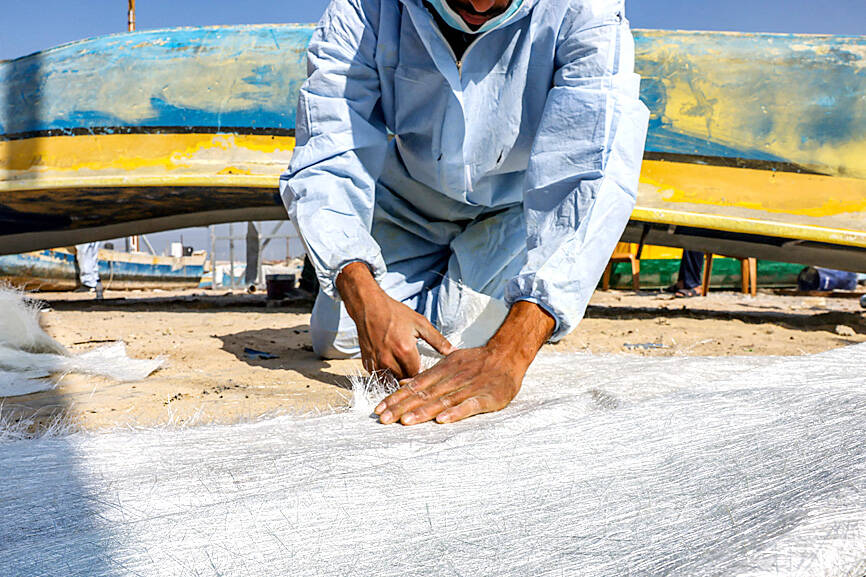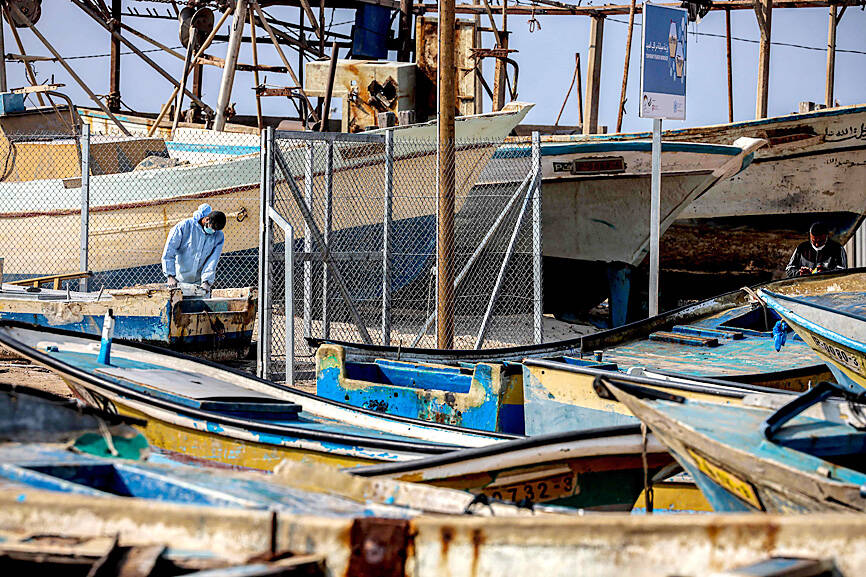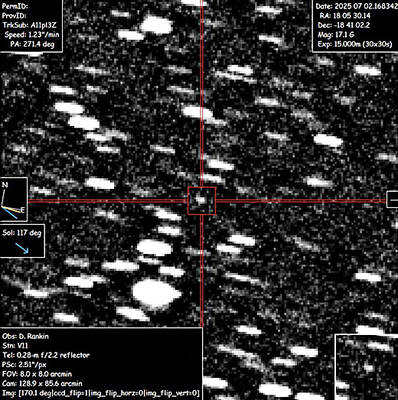Wearing sky blue overalls near the Port of Gaza, technician Mohammed Jerboa celebrates the chance to finally repair fishing boats after a 15-year Israeli ban on vital materials.
It is a “great achievement,” he said after sanding down the faded paint as part of a team of workers patching up rickety boats with sheets of newly imported fiberglass.
The material has been prohibited from entering the Palestinian enclave since 2007, as one of scores of items Israel deems could be used for military purposes by Gaza militants.

Photo: AFP
The measures have left fishers struggling for years to pursue their livelihood due to the state of the boats — until the UN brokered a deal that allows fiberglass to reach a supervised workshop.
“I started working at this workshop two weeks ago ... for the fishermen and for us as technicians, this provided a job opportunity,” Jerboa said.
Gaza has one of the world’s highest unemployment rates at nearly 50 percent, World Bank data showed.

Photo: AFP
Dust flies as the team gets to work, within view of a security camera, while the smell of fresh paint drifts across the fenced yard from a recently refurbished boat.
Rows of unseaworthy vessels rest in the sand nearby, with rusty parts and covered in scratches, laying bare the scale of the task at hand.
Manal al-Najjar, a coordination officer at the UN Office for Project Services — which handles infrastructure projects — said there are still 300 boats to be fixed.
After months of negotiations with Palestinian and Israeli officials, the UN reached a deal that allows enough fiberglass for 10 boats to enter Gaza at a time.
“The repair process takes two weeks to a month for every 10 boats,” al-Najjar said.
With the first repaired boats hitting the water, she added that fishers so far are happy with the project as “the price is very reasonable and the quality of the materials is high.”
Standing near piles of nets at the port, fisherman Saleem al-Assi was one of the first to be selected for the project and agreed the costs were low.
“I’ve had boats out of action for eight years and they need a lot of fiberglass,” said al-Assi, who has about 50 relatives working in the fishing trade.
“Hundreds of fishermen applied to the project, but the project can’t cover everyone,” he added.
In addition to the difficulty in obtaining materials, the fishing industry has been hit by restrictions at sea. As part of Israel’s blockade on Gaza, imposed in 2007 after the Palestinian militant group Hamas took power, the navy enforces a fishing zone that limits the catch.
Israel has fought four wars with Palestinian militants over the past 14 years, as well as a three-day conflict in August that left 49 Gazans dead.
At the port, al-Assi welcomed the fiberglass project, but lamented that he still cannot get his family’s nine boats out to sea.
“We only have two motors. Motors are nonexistent,” he said.
Al-Najjar acknowledged the shortage, and said the UN plans to import motors as part of its project.
Standing beside the calm Mediterranean waters, al-Assi said the lack of equipment due to Israeli restrictions has “suffocated us.”
“I don’t know why Israel is blocking their entry,” he said. “Will rockets be fired from boats?”

Two former Chilean ministers are among four candidates competing this weekend for the presidential nomination of the left ahead of November elections dominated by rising levels of violent crime. More than 15 million voters are eligible to choose today between former minister of labor Jeannette Jara, former minister of the interior Carolina Toha and two members of parliament, Gonzalo Winter and Jaime Mulet, to represent the left against a resurgent right. The primary is open to members of the parties within Chilean President Gabriel Boric’s ruling left-wing coalition and other voters who are not affiliated with specific parties. A recent poll by the

TENSIONS HIGH: For more than half a year, students have organized protests around the country, while the Serbian presaident said they are part of a foreign plot About 140,000 protesters rallied in Belgrade, the largest turnout over the past few months, as student-led demonstrations mount pressure on the populist government to call early elections. The rally was one of the largest in more than half a year student-led actions, which began in November last year after the roof of a train station collapsed in the northern city of Novi Sad, killing 16 people — a tragedy widely blamed on entrenched corruption. On Saturday, a sea of protesters filled Belgrade’s largest square and poured into several surrounding streets. The independent protest monitor Archive of Public Gatherings estimated the

Irish-language rap group Kneecap on Saturday gave an impassioned performance for tens of thousands of fans at the Glastonbury Festival despite criticism by British politicians and a terror charge for one of the trio. Liam Og O hAnnaidh, who performs under the stage name Mo Chara, has been charged under the UK’s Terrorism Act with supporting a proscribed organization for allegedly waving a Hezbollah flag at a concert in London in November last year. The rapper, who was charged under the anglicized version of his name, Liam O’Hanna, is on unconditional bail before a further court hearing in August. “Glastonbury,

FLYBY: The object, appears to be traveling more than 60 kilometers per second, meaning it is not bound by the sun’s orbit, astronomers studying 3I/Atlas said Astronomers on Wednesday confirmed the discovery of an interstellar object racing through the solar system — only the third-ever spotted, although scientists suspect many more might slip past unnoticed. The visitor from the stars, designated 3I/Atlas, is likely the largest yet detected, and has been classified as a comet, or cosmic snowball. “It looks kind of fuzzy,” said Peter Veres, an astronomer with the International Astronomical Union’s Minor Planet Center, which was responsible for the official confirmation. “It seems that there is some gas around it, and I think one or two telescopes reported a very short tail.” Originally known as A11pl3Z before